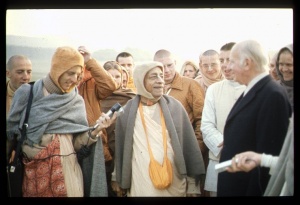SB 7.15.65: Difference between revisions
m (1 revision(s)) |
No edit summary |
||
| Line 1: | Line 1: | ||
{{info | {{info | ||
|speaker= | |speaker=Nārada Muni | ||
|listener=King | |listener=King Yudhiṣṭhira | ||
}} | }} | ||
[[Category:Srimad-Bhagavatam - Canto 07 Chapter 15]] | |||
[[Category:Bhagavatam Verses Spoken by Narada Muni - Vanisource|071565]] | |||
<div style="float:left">'''[[Srimad-Bhagavatam]] - [[SB 7|Seventh Canto]] - [[SB 7.15: Instructions for Civilized Human Beings|Chapter 15: Instructions for Civilized Human Beings]]'''</div> | |||
<div style="float:right">[[File:Go-previous.png|link=SB 7.15.64]] '''[[SB 7.15.64]] - [[SB 7.15.66]]''' [[File:Go-next.png|link=SB 7.15.66]]</div> | |||
{{RandomImage}} | |||
==== TEXT 65 ==== | ==== TEXT 65 ==== | ||
<div | <div class="verse"> | ||
ātma-jāyā-sutādīnām | :ātma-jāyā-sutādīnām | ||
anyeṣāṁ sarva-dehinām | :anyeṣāṁ sarva-dehinām | ||
yat svārtha-kāmayor aikyaṁ | :yat svārtha-kāmayor aikyaṁ | ||
dravyādvaitaṁ tad ucyate | :dravyādvaitaṁ tad ucyate | ||
</div> | </div> | ||
| Line 17: | Line 22: | ||
==== SYNONYMS ==== | ==== SYNONYMS ==== | ||
<div | <div class="synonyms"> | ||
''ātma''—of one's self; ''jāyā''—wife; ''suta-ādīnām''—and children; ''anyeṣām''—of one's relatives, etc.; ''sarva-dehinām''—of all other living entities; ''yat''—whatever; ''sva-artha-kāmayoḥ''—of one's ultimate goal and benefit; ''aikyam''—oneness; ''dravya-advaitam''—oneness of interest; ''tat ucyate''—it is called. | |||
</div> | </div> | ||
| Line 24: | Line 29: | ||
==== TRANSLATION ==== | ==== TRANSLATION ==== | ||
<div | <div class="translation"> | ||
When the ultimate goal and interest of one's self, one's wife, one's children, one's relatives and all other embodied living beings is one, this is called dravyādvaita, or oneness of interest. | When the ultimate goal and interest of one's self, one's wife, one's children, one's relatives and all other embodied living beings is one, this is called dravyādvaita, or oneness of interest. | ||
</div> | </div> | ||
| Line 31: | Line 36: | ||
==== PURPORT ==== | ==== PURPORT ==== | ||
<div | <div class="purport"> | ||
The actual interest of all living entities—indeed, the goal of life—is to return home, back to Godhead. This is the interest of one's own self, one's wife, one's children, one's disciples and one's friends, relatives, countrymen and all humanity. The Kṛṣṇa consciousness movement can give directions for management by which everyone can partake in Kṛṣṇa conscious activities and reach the ultimate goal, which is known as svārtha-gatim. This objective of everyone's interest is Viṣṇu, but because people do not know this (na te viduḥ svārtha-gatiṁ hi viṣṇum ([[SB 7.5.31]])), they are making various plans by which to fulfill so many concocted interests in life. The Kṛṣṇa consciousness movement is trying to bring everyone to the highest interest. The process may be differently named, but if the aim is one, people should follow it to achieve the ultimate goal in life. Unfortunately, people are thinking of different interests, and blind leaders are misleading them. Everyone is trying to reach the goal of complete happiness materially; because people do not know what complete happiness is, they are materially diverted toward different interests. | The actual interest of all living entities—indeed, the goal of life—is to return home, back to Godhead. This is the interest of one's own self, one's wife, one's children, one's disciples and one's friends, relatives, countrymen and all humanity. The Kṛṣṇa consciousness movement can give directions for management by which everyone can partake in Kṛṣṇa conscious activities and reach the ultimate goal, which is known as ''svārtha-gatim''. This objective of everyone's interest is Viṣṇu, but because people do not know this (''na te viduḥ svārtha-gatiṁ hi viṣṇum'' ([[SB 7.5.31]])), they are making various plans by which to fulfill so many concocted interests in life. The Kṛṣṇa consciousness movement is trying to bring everyone to the highest interest. The process may be differently named, but if the aim is one, people should follow it to achieve the ultimate goal in life. Unfortunately, people are thinking of different interests, and blind leaders are misleading them. Everyone is trying to reach the goal of complete happiness materially; because people do not know what complete happiness is, they are materially diverted toward different interests. | ||
</div> | </div> | ||
__NOTOC__ | |||
<div style="float:right; clear:both;">[[File:Go-previous.png|link=SB 7.15.64]] '''[[SB 7.15.64]] - [[SB 7.15.66]]''' [[File:Go-next.png|link=SB 7.15.66]]</div> | |||
__NOTOC__ | |||
__NOEDITSECTION__ | |||
Revision as of 03:21, 3 July 2021

A.C. Bhaktivedanta Swami Prabhupada
TEXT 65
- ātma-jāyā-sutādīnām
- anyeṣāṁ sarva-dehinām
- yat svārtha-kāmayor aikyaṁ
- dravyādvaitaṁ tad ucyate
SYNONYMS
ātma—of one's self; jāyā—wife; suta-ādīnām—and children; anyeṣām—of one's relatives, etc.; sarva-dehinām—of all other living entities; yat—whatever; sva-artha-kāmayoḥ—of one's ultimate goal and benefit; aikyam—oneness; dravya-advaitam—oneness of interest; tat ucyate—it is called.
TRANSLATION
When the ultimate goal and interest of one's self, one's wife, one's children, one's relatives and all other embodied living beings is one, this is called dravyādvaita, or oneness of interest.
PURPORT
The actual interest of all living entities—indeed, the goal of life—is to return home, back to Godhead. This is the interest of one's own self, one's wife, one's children, one's disciples and one's friends, relatives, countrymen and all humanity. The Kṛṣṇa consciousness movement can give directions for management by which everyone can partake in Kṛṣṇa conscious activities and reach the ultimate goal, which is known as svārtha-gatim. This objective of everyone's interest is Viṣṇu, but because people do not know this (na te viduḥ svārtha-gatiṁ hi viṣṇum (SB 7.5.31)), they are making various plans by which to fulfill so many concocted interests in life. The Kṛṣṇa consciousness movement is trying to bring everyone to the highest interest. The process may be differently named, but if the aim is one, people should follow it to achieve the ultimate goal in life. Unfortunately, people are thinking of different interests, and blind leaders are misleading them. Everyone is trying to reach the goal of complete happiness materially; because people do not know what complete happiness is, they are materially diverted toward different interests.